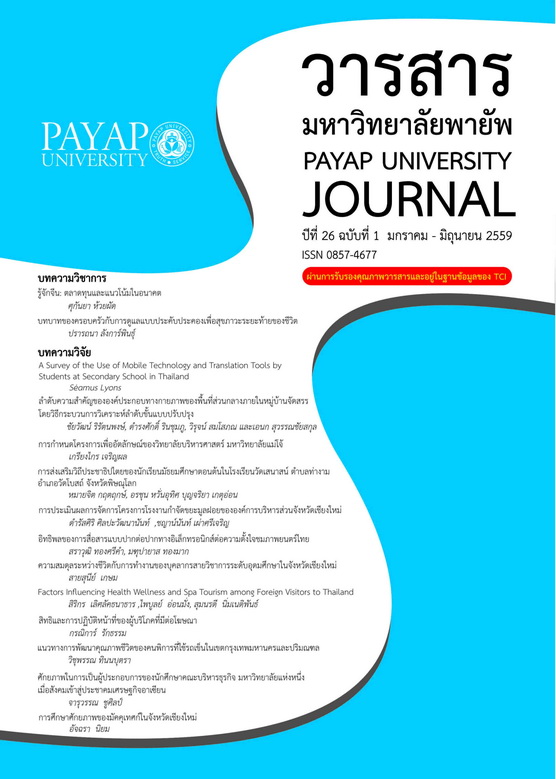A SURVEY OF THE USE OF MOBILE TECHNOLOGY AND TRANSLATION TOOLS BY STUDENTS AT SECONDARY SCHOOL IN THAILAND
Main Article Content
บทคัดย่อ
การวิจัยเชิงปริมาณครั้งนี้มีวัตถุประสงค์เพื่อศึกษาการใช้เทคโนโลยีเพื่อการแปลของนักเรียน และตรวจสอบเครื่องมือที่นักเรียนเหล่านั้นใช้สำหรับการแปล โดยเก็บข้อมูลจากนักเรียนจำนวน 1,707 คนจากโรงเรียนมัธยมสี่แห่งในจังหวัดเชียงใหม่ ซึ่งในจำนวนนี้ประกอบด้วยตัวแทนนักเรียนจากแต่ละสายชั้น (ในระดับมัธยม) เพื่อสืบหาความนิยมหรือความแตกต่างของนักเรียนในแต่ละสายชั้น งานวิจัยนี้วิเคราะห์ผลจากคำถามปลายปิดที่เขียนเป็นภาษาไทย ผลการวิจัยแสดงให้เห็นว่านักเรียนส่วนมากนิยมใช้เทคโนโลยีแบบพกพา (ร้อยละ 90.6) และเลือกที่จะใช้โทรศัพท์เพื่อการแปลภาษาไทยเป็นภาษาอังกฤษ (ร้อยละ 74.5) เครื่องมือแปลภาษาโดยกูเกิ้ล (Google Translate) ได้รับการลงคะแนนว่าเป็นเครื่องมือแปลภาษาที่นักเรียนนิยมใช้มากที่สุด (ร้อยละ 72.5) ถัดมาคือแอพลิเคชั่น LEXiTRON ในโทรศัพท์มือถือ (ร้อยละ 14.4) ความต้องการในการใช้โทรศัพท์มือถือมากกว่าคอมพิวเตอร์นั้นเพิ่มขึ้นหลังจากปีแรกที่ทำการศึกษาจนถึงปีสุดท้าย กลุ่มนักเรียนในชั้นปีแรกๆ มักจะเลือกใช้เครื่องมือแปลภาษาโดยกูเกิ้ลมากที่สุด (มากกว่าร้อยละ 80) ในขณะที่กลุ่มนักเรียนในชั้นปีสุดท้ายมีความต้องการในการใช้เครื่องมือแปลภาษาโดยกูเกิ้ลน้อยลงเหลือเพียงร้อยละ 58.1
Article Details
เอกสารอ้างอิง
Babylon. (2015). Babylon’s Free Online Translation available from http://translation.babylon.com/
Baidu .(2015). Baidu Online Translation available from http://translate.baidu.com/
Bibby S. .(2011). Do Students Wish to ‘Go Mobile’? An Investigation into Student Use of PCs and Cell Phones. International Journal of Computer-Assisted Language Learning and Teaching, 1(2), 43-54, April-June 2011 43.
Bing .(2015.) Bing Translator available from https://www.bing.com/translator/
Bomhold C. .(2013). Educational use of smart phone technology: A survey of mobilephone application use by undergraduate university students, Program: electronic library and information systems, Vol. 47 Issue: 4, pp.424 – 436.
Bonnington C. .(Feb 2015). In Less Than Two Years, a Smartphone Could Be Your Only Computer [Online] Available from:http://www.wired.com/2015/02/smartphone-only-computer/ [Accessed 9th July 2015]
Chiriac P. (June 2014) EAS Survey Shows That Over 50% of Students Would Buy an App Recommended by Their Institution! [Online] Available from: http://www.educationalappstore.com/blog/eas-survey-shows-50-students-buy-app-recommended-institution/ [Accessed 14th July 2015]
Daily Mail Online (May 2015) Google reveals more searches are made from mobile devices than PCs for the first time [Online] Available from: http://www.dailymail.co.uk/sciencetech/article-3069322/Google-reveals-searches-mobile-devices-PCs-time.html [Accessed 9th July 2015]
Davies Boren Z. (Oct 2014) There are officially more mobile devices than people in the world [Online] Available from: http://www.independent.co.uk/life-style/gadgets-and-tech/news/there-are-officially-more-mobile-devices-than-people-in-the-world-9780518.html [Accessed 9th July 2015]
Google .(2015). Google Translate available from https://translate.google.com/
Google Play .(2015). Google Play Store available from: https://play.google.com/store/apps/
Halleck H. .(Feb 2014). We Spend More Time On Smartphones Than Traditional PCs: Nielsen [Online] Available from: http://www.ibtimes.com/we-spend-more-time-smartphones-traditional-pcs-nielsen-1557807 [Accessed 9th July 2015]
Kats R. (April 2013) Google exec: Mobile is biggest revolution in computing since emergence of Internet [Online] Available from: http://www.mobilemarketer.com/cms/news/advertising/15133.html [Accessed 9th July 2015]
Kessler (May 2011) 38% of College Students Can't Go 10 Minutes Without Tech, [Online] Available on http://mashable.com/2011/05/31/college-tech-device-stats/ [Accessed 8th July 2015]
Krejcie R. and Morgan D. .(1970). Determining Sample Size for Research Activities, in the Educational and Psychological Measurement, issue 30, pp 607-610. [Online] Available from http://research-advisors.com/tools/SampleSize.htm [Accessed 9 Nov 2014]
Kukulska-Hulme, A. and Shield, L. (2008). An overview of mobile assisted language learning: From content delivery to supported collaboration and interaction. ReCALL, 20(3), pp. 271–289.
Lexitron .(2015). LEXiTRON Thai-English Electronic dictionary, available from http://suparsit.com/index1.php
Line .(2015). Line Dict Translate avaiable from http://translate.linedict.com/#linedict_web/th/en
Merschel, L., Munné, J. and Clifford, J. .(June 2013). Surveying the Landscape: What is theRole of Machine Translation in Language Learning? Published in @tic. revista d’innovació educativa. (nº 10).
Modhiran, T., Kosawat K., Klaithin S., Boriboon M. and Supnithi T. .(2005). “PARSITTE: Online Thai-English Machine Translation”. In Proceedings of the MT Summit X. 13-15 September 2005, Phuket, Thailand. Pages 404-411.
Mueller E. .(April 2013). The Elephant in the Room: Machine Translation in the Language Classroom, [Online] Available on http://cit.duke.edu/blog/2013/04/the-elephant-in- the-room-machine-translation-in-the-language-classroom/ [Accessed 10 Nov 2014]
Munpru S. and Wuttikrikunlaya P. .(2013). A Survey of Online Tools Used in English-Thai and Thai-English Translation by Thai Students, 3rd International conference on Foreign Language Learning and Teaching (FLLT), Bangkok, Thailand.
Murtagh R. .(Jul 2014). Mobile Now Exceeds PC: The Biggest Shift Since the Internet Began [Online] Available from: http://searchenginewatch.com/sew/ opinion/2353616/mobile-now-exceeds-pc-the-biggest-shift-since-the-internet-began [Accessed 9th July 2015]
Nielson L. .(Feb 2013). Finally! Research-based proof that students use cell phones for LEARNING. [Accessed 31 Oct 2014] [Online] Available from http://theinnovativeeducator.blogspot.com/2013/02/finally-research-based-proof-that.html
Scheafler R., Mendenhall W., Ott R. and Gerow K .(2012). Survey Sampling, 7th edition, International edition, Cengage Learning, Canada.
Shen E. .(2010). Comparison of online machine translation tools [Online] Available from: http://www.tcworld.info/e-magazine/translation-and localization/article/comparison-of-online-machine-translation-tools/ [Accessed 20th May 2015]
Somers, H., Gaspari F. and Niño A. .(2006). Detecting inappropriate use of free online machine translation by language students – A special case of plagiarism detection. In 11th Annual Conference of the European Association for Machine Translation – Proceedings, Oslo, 41–48.
Translate .(2015). Dictionary.com available from http://translate.reference.com/
Trochim W. .(2006). Probability Sampling [Online] Available from: http://www.socialresearchmethods.net/kb/sampprob.php [Accessed 9 Dec 2014]
Wilkinson R. and Lancaster T. .(2014). Improving student motivation using technology within the STEM disciplines 2014. Report from the Higher Education Academy, HEA STEM Conference 2014.


